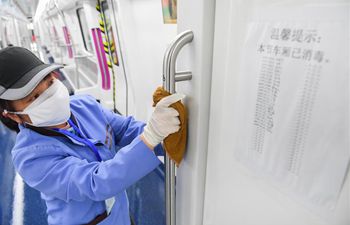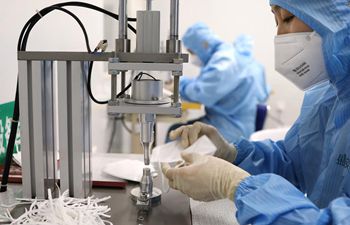CHICAGO, Feb. 14 (Xinhua) -- Drinking flavanol-rich cocoa three times a day improved walking distance in individuals with peripheral artery disease (PAD), reports a Northwestern Medicine study.
Forty-four participants in the cocoa group of the trial drank a beverage containing one tablespoon of unprocessed, non-alkalized cocoa three times a day. That's a total of 75 milligrams of epicatechin, the most prominent flavanol in cocoa, believed to be responsible for the improvement in blood flow and walking.
The researchers found the cocoa drinkers had 20 percent improved blood flow to their calves and improved muscle health and function compared to the placebo group. The cocoa drinkers also had 14-percent increased density of their capillaries, tiny blood vessels that deliver oxygen to the tissue.
The improvement in capillaries has been shown in animal studies; this is the first time it has been shown in humans.
Moreover, mitochondrial activity, a marker of energy production in the cell and healthy muscle, improved 98 percent. The cocoa reached its peak effect three hours after ingestion.
People aged 60 years and older who drank the cocoa beverage three times a day for six months were able to walk up to 42.6 meters or about 140 feet farther in a six-minute walking test, compared to those who drank the same type of beverages without cocoa.
"The epicatechins in chocolate help dilate blood vessels, which enables more oxygen to travel to the tissues," said lead author Mary McDermott, a professor of medicine at Northwestern University's (NU) Feinberg School of Medicine. "In animal studies, epicatechin also promotes muscle growth and can reverse the atrophy of muscles common in PAD patients."
The cocoa used in the study was rich in epicatechin, which exists in larger quantities in dark chocolate than in milk chocolate.
With aging, blood flow to the legs declines even in otherwise healthy people. Older people also have poorer muscle health and mitochondrial activity. Therefore, there is the potential for cocoa to help improve walking in older people without PAD as well, McDermott said.
McDermott stressed the trial of 44 people was a small sample size, and a larger clinical trial is needed to confirm the findings.
PAD affects about 8.5 million people in the United States. People with PAD have blockages in their arteries that slow or stop the blood flood flow to their legs. As a result, they have pain and difficulty walking even short distances.
The study was published Friday in Circulation Research.

















